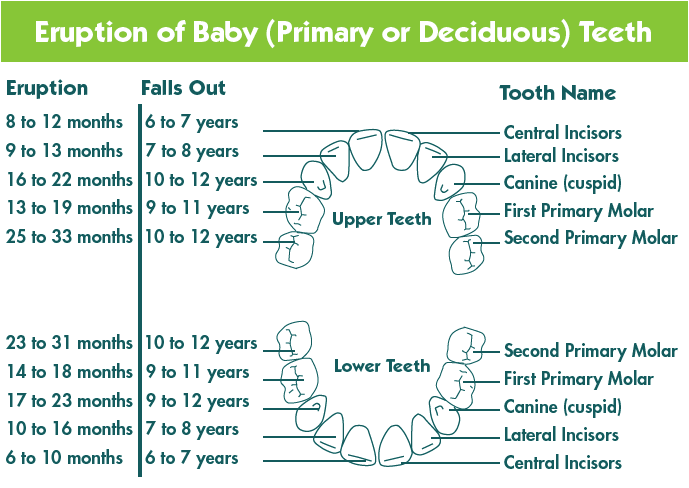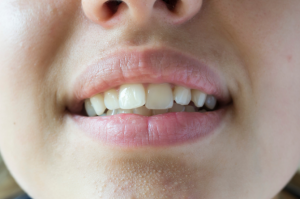Some parents might wonder, “Are baby teeth really that important to my child?”
Primary, or “baby,” teeth are important for many reasons. Not only do they help children speak clearly and chew naturally, they also aid in forming a path that permanent teeth can follow when they are ready to erupt. A missing baby tooth at a young age leaves a gap, which may be closed up by shifting of neighbouring teeth, causing the permanent tooth to have no space to erupt.
From brushing their first tooth to preventing tooth decay, here’s how to take care of children’s teeth.
How to take care of children’s teeth: All that you need to know
When should we begin using toothpaste and how much should we use?
The sooner the better! Starting at birth, clean your child’s gums with a soft infant toothbrush or cloth and water. As soon as the teeth begin to appear, start brushing twice daily using fluoridated toothpaste and a soft, age-appropriate sized toothbrush. Use a “smear” of toothpaste to brush the teeth of a child less than 2 years of age.
For the 2-5 year old, dispense a “pea-size” amount of toothpaste and perform or assist your child’s toothbrushing. Remember that young children do not have the ability to brush their teeth effectively. Children should spit out and not swallow excess toothpaste after brushing.
How long should a parent brush or help brush a child’s teeth?
It takes many years before children develop the fine motor coordination they need to do a good tooth brushing job. Some dentists advise that parents brush their children’s teeth until the child can neatly write his or her own name.
Other dentists suggest parents use their own judgment, but to consider between ages 6 and 8 as the time for kids to take on the job of keeping their teeth clean and healthy. General rule: A smear or pea sized drop of fluoridated toothpaste can be used when the child can spit effectively.
Are hard candies or sticky ones bad for your child’s teeth?
Candies, hard or chewy, are bad for several reasons. The hardness and stickiness can break teeth, loosen fillings, and yank out crowns. The sugar content allows bacteria to proliferate and create cavities. And most importantly, candy creates an acidic environment in the saliva, which becomes a breeding ground for deep decay.

How do I make my child’s diet safe for his teeth?
Make sure your child has a balanced diet, including one serving each of: fruits and vegetables, breads and cereals, milk and dairy products, and meat fish and eggs.
Limiting the servings of sugars and starches to within MEAL TIME will also aid in protecting your child’s teeth from decay. You can also ask our Oral Hygiene Therapist about your child’s diet to help you select foods that protect your children’s teeth.
How can parents help prevent tooth decay?
Parents should take their children to the dentist regularly, beginning with the eruption of the first tooth. Then, the dentist can recommend a specific program of brushing, flossing, and other treatments for parents to supervise and teach to their children. These home treatments, when added to regular dental visits and a balanced diet, will help give your child a lifetime of healthy habits.
What does it mean when my child’s tooth turns into an opaque dark colour?
Discolouration or darkening of a tooth usually results from a tooth that has been traumatised from an injury and caused damage to the nerve. This discolouration usually happens 2-3 weeks after the accident. If the tooth turns grey, brown or black, it is because the blood capillaries are damaged.
Baby teeth usually do get lighter over time (about 6 months on average), and if the tooth doesn’t bother your child you can leave it alone. A pink tooth, however, indicates either internal resorption, or the presence of blood pigments within the tooth. The pink tooth needs to be monitored closely by our doctors or Oral Hygiene Therapist.
What should I do if my child has a toothache?
First, rinse the irritated area with warm salt water and place a cold compress on the face if it is swollen. Give the child acetaminophen for any pain, rather than placing aspirin on the teeth or gums. Finally, see a dentist as soon as possible.
How do dental sealants work?
Sealants work by filling in the crevasses on the chewing surfaces of the teeth. This shuts out food particles that could get caught in the teeth, causing cavities. The application is fast and comfortable and can effectively protect teeth for many years.
What should I do if my child falls and knocks out a permanent tooth?
The most important thing to do is to remain calm. Then find the tooth. Hold it by the crown rather than the root and try to reinsert it in the socket. If that is not possible, soak the tooth in cold milk and take your child and the tooth immediately to a dentist.
My child has a permanent tooth coming out behind/in front of the baby tooth, and the baby tooth is not falling out. Is it a problem?
In most cases, the baby teeth will fall out naturally. We advise parents to refer to the following chart for the age gap during which the baby teeth should fall out. If your child is within the age bracket, you can wait for the baby tooth to be pushed out by movement of the permanent tooth, or perhaps by asking your child to bite on an apple.

If, however, the child complains of pain or bleeding, come see our Oral Hygiene Therapist to help with removing the tooth.
My child had an over-retained tooth (baby tooth blocking permanent tooth) previously, now the permanent tooth is misaligned, what should we do?
Less known to parents, baby teeth should have “gaps” in between them, to allow for the eruption of larger, permanent teeth in the future. If your child has enough space between the baby teeth, the permanent tooth will likely move into space to align with the other teeth due to pushing forces from the tongue, lips and cheeks.
If your child has very tight baby teeth (difficulty in flossing, for example), the permanent tooth may not have enough space to align itself. Our Oral Hygiene Therapist will be able to assist you in understanding the situation of your child’s teeth.
How safe are dental X-rays?
There is very little risk in dental X-rays. According to The Radiological Society of North America and American College of Radiology, exposure from a dental X-ray is approximately equivalent to 1 day of environmental background radiation (i.e. walking under the sun).
We hope you found this article on how to take care of children’s teeth useful. If you have any concerns about your child’s teeth, contact us at 62820122 or WhatsApp us at (+65) 8057 7381.




